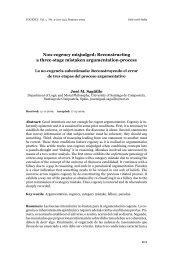Cogency v2 n2
Cogency v2 n2
Cogency v2 n2
Create successful ePaper yourself
Turn your PDF publications into a flip-book with our unique Google optimized e-Paper software.
COGENCY Vol. 2, N0. 2, Spring 2010<br />
tieth and twenty-first century philosophy, though it is often obscured by<br />
short and confusing sentences puzzlingly juxtaposed with other precise and<br />
illuminating remarks. This presents an obstacle to those who would understand<br />
his messages just as the flowers partially conceal his face in this photograph.<br />
The photograph also seems to show another very theme associated<br />
with the Austrian: an interest in solipsism both philosophical and lived. In<br />
the photo he distances himself from his immediate environment, his figure<br />
thus presents the idea of a constant solitude even in the midst of activity. 3<br />
But this interpretation can only be fruitful if now I say something about<br />
the reasons why <strong>Cogency</strong> opens its space to this special philosophical character.<br />
<strong>Cogency</strong> attempts to contribute to the arena of argumentation theory<br />
and reasoning not only by publishing papers with new ideas and reflections,<br />
but also by offering a scenario for discussions about people, theories, and conwith<br />
his surroundings which he thought undesirable. Outside the circle of his family and<br />
personal friends, very little was known about his life and character. His inaccessibility contributed<br />
to absurd legends about his personality and to widespread misunderstandings of<br />
his teaching.” (Malcolm, 1962: 2) Malcolm gives a more explicit demonstration of<br />
Wittgenstein’s uncommon manners: “My wife once gave him some Swiss cheese and rye<br />
bread for lunch, which he greatly liked. Thereafter he would more or less insist on eating<br />
bread and cheese at all meals, largely ignoring the various dishes that my wife prepared.<br />
Wittgenstein declared that it did not much matter to him what he ate, so long as it was<br />
always the same. When a dish that looked especially appetizing was brought to the table, I<br />
sometimes exclaimed ‘Hot Ziggety’-a slang phrase that I learned as a boy in Kansas.<br />
Wittgenstein picked up this expression from me. It was inconceivably droll to hear him<br />
exclaim ‘Hot Ziggety’ when my wife put the bread and cheese before him. During the first<br />
part of his visit Wittgenstein insisted on helping to wash the dishes after meals, and he was<br />
as before very fussy about the amount of soap and hot water that ought to be used and<br />
whether there was the right sort of dish mop. Once he rebuked me sternly for not rinsing<br />
properly. Before long, however, he left the dishes alone, and indeed his bodily strength so<br />
declined that he was not equal to that exertion.” (Malcolm, 1962: 85)<br />
3<br />
Though he uses rather an unfriendly tone towards Wittgenstein, Ernest Gellner (1999)<br />
nevertheless suggests ideas that help us to better understand the position of Wittgenstein in<br />
the mainstream of Western philosophy. For example, commenting upon his self-exile combined<br />
with an evaluation of the Tractatus, Gellner says: “Ludwig Wittgenstein’s Tractatus<br />
Logico-Philosophicus (1922) is a poem to solitude. It is also an expression of the individualistic-<br />
universalistic, atomic vision of knowledge, thought, language and the world. That vision<br />
logically engenders solitude –though the sense of solitude may well also have had other<br />
roots... The poem is all the more effective for its dogmatic, oracular style: the ideas are<br />
presented not as an opinion, which is to be argued against some possible alternative vision,<br />
or against mere doubt, as one case among others; but rather as an unquestionable, selfevident<br />
set of verities; which do not permit legitimate questioning and whose status is somehow<br />
far beyond that of mere earthly affirmation. The dogmatism is brazen. This was ever<br />
Wittgenstein’s style. Contingent truths did not interest him much: he was eager to reach the<br />
very limits of conceptual choice.” (1999: 46).<br />
8








